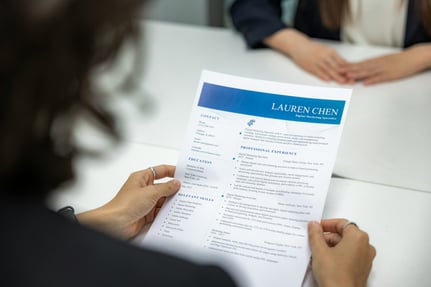There are small but important differences between a ‘good’ candidate and an exceptional one. The way you choose to present yourself on your CV could be the deciding factor in getting an interview for your ideal engineering job.
Here are the top five insider tips on how to improve your CV and find your next engineering job.
How to Improve Your CV:
1. Presentation
The content of your CV is most important, but good presentation helps to give a positive first impression. Recruiters and hiring managers can see hundreds of CVs every day from candidates who have similar skill sets, meaning you need to stand out from your competition – and in the right way.
For professional and effective CV presentation, improve your CV with these handy tips:
-
Use bullet points to split up big chunks of information and make the text more reader-friendly, so the recruitment consultant will find it as easy as possible to read on and discover more about your skills and experience.
-
Images and visual effects are unnecessary and often distracting. Use bolding, italics, underlining and a clear structure to help your CV appear consistent, clean and professional without fading into the background.
-
Emphasise your greatest achievements. List your most significant accomplishments in order of importance for each of your previous roles from the top down. Allow the recruiter considering your CV to build an excellent impression of your previous and potential capabilities as quickly as possible.
-
Don’t clutter your CV: less can be more. White space on every page limits distraction; your reader will find it easier to focus on what you want them to see most.

2. Short and Strong
Improve your CV by writing clearly, succinctly and confidently. For engineering contractors with a long list of previous technical jobs, you may feel your CV needs to be longer than the standard 2-3 pages to cover all your experience. The page limit is not the problem: it’s the amount and quality of the information on those pages.
Try to only include the skills and achievements that are most relevant: if it’s not important to the job you are applying for, don’t include it. Use no more than five bullet points for each job listed on your CV unless absolutely necessary.
3. Make It Clear Why You're Right For The Job
The purpose of your CV is to highlight your achievements and relevant experience to present you as the ideal person for the job. Key words that hiring managers and recruiters in your industry will be looking for can evidence your engineering knowledge and grab the eyes of your reader. Spell out that you have experience in CNC Milling, CNC Turning and CNC Programming instead of just saying you work in Precision Engineering; Software Engineers should list the exact types of software they work with, and managers and senior executives can outline the size of the teams they lead or the major projects they are responsible for.
The person reading your CV needs to understand what you do – recruiters can’t confidently put you forward for interviews if they aren’t sure whether your skills and experience will match the job requirements. Make it as easy as possible for the employer to match you to the job description.
How do you know if you should improve your CV? Try it out. Share your CV with someone who is not in your industry or function and ask them to describe what you do, what are your best skills and why you are a good candidate. If they can easily understand your CV, specialist recruiters will have no trouble in confidently submitting you for your ideal engineering job.

4. A Perfect Fit: Tailor your CV to the Role
Ask your recruitment consultant for a written job description. To help your recruiter match your skills and experience to the right job for you, carefully improve your CV by tailoring it to the relevant job description:
-
Evidence how you have performed similar duties and solved similar problems in your previous roles
-
Emphasise how your relevant skills can be transferred to this position – this is even more important if you are transferring industries or
-
Show enthusiasm for the area and challenges of the job description throughout your CV.
Aligning your CV to a potential engineering job also informs the expectations of your new employer when you start working from them. Your new boss will have an idea of how your skillset can develop and how to help you grow in your career.
5. Do's And Don'ts
Do include:
-
Professional qualifications – Accreditations related to your career will show your commitment to improving your skillset and reveal your potential for growth in your new role.
-
A small personal statement – A busy recruiter or hiring manager should be able to get an immediate feel for who you are and why you are good at what you do. Your statement should be no more than a couple of sentences and quickly communicate your skills, experience and why these offer you as an excellent candidate.
-
Contact details – This is an obvious point but surprisingly often overlooked – there’s nothing more frustrating than finding an excellent candidate and not being able to contact them! List multiple contact details including your email, mobile number and landline to ensure you don’t miss out on fantastic engineering jobs.
Don’t include:
-
A photo – recruiters don’t need to see what you look like, and clients are only interested in whether you have the skills and experience for the job. This rule can differ in some countries around the world, so check the application process for where you're applying to.
-
References – at this stage, references aren’t essential and will add clutter to your CV. Include a brief line such as ‘References available on request’ at the end of your CV to show that you have evidence of your skills and experience from reliable sources.
Need help with Job Interviews? Read our Top 8 Interview Tips for your best interview yet.




